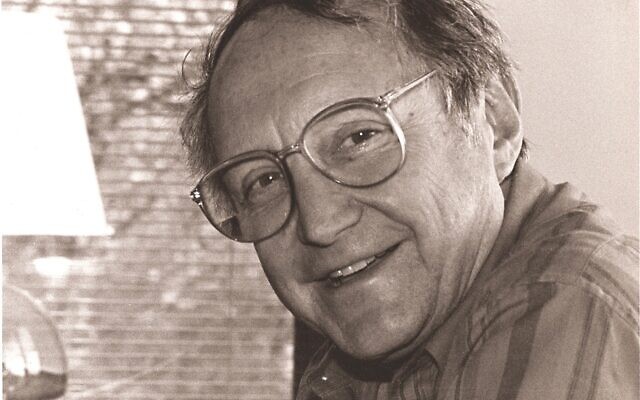Leon Eplan
Leon Eplan, a man of infectious optimism, whose life’s work helped lift the city of Atlanta to new heights, passed away April 15, 2021, at the age of 92.
Leon Eplan, a man of infectious optimism, whose life’s work helped lift the city of Atlanta to new heights, passed away April 15, 2021, at the age of 92.
Born to Sam and Bess Eplan Nov. 24, 1928, Leon was a fourth-generation Jewish Atlantan. He grew up in Midtown, attending Boys High (now Grady High School) and later Emory University. He participated in the AZA youth organization, where he was elected to regional and national positions. He relished the debate, basketball, dances and travel during those years, retaining lifelong friendships that he cherished.
A self-described wayward student in his early youth, he hit his stride in his 20s, accumulating master’s degrees from the University of Tennessee, the University of North Carolina and the London School of Economics.
After a short stint in the army, he met and married Madalyne Buchman in 1959, and they shared a wonderful and adventuresome life together. With their three children, extended family and countless friends, their Ansley Park home was always full of people. Leon loved his big rambling house and was devoted to the neighborhood. He often liked to recount that he and Madalyne couldn’t get a loan when they first sought to live in Ansley Park because the neighborhood was redlined by the banks as a neighborhood “in decline.” Leon crafted a neighborhood plan in the 1960s, helping to revive the neighborhood to its historic glory. They lived in the house for 50 years.
He began a long and illustrious city planning career as a consultant to cities around the country. During this time, he was also involved in the planning of the MARTA rail system.
In 1974, he was tapped by the newly elected mayor Maynard Jackson to become the commissioner of budget and planning, serving in that role from 1974 to 1978. One of his most enduring accomplishments during that time was the creation of the Neighborhood Planning Unit program, which gives local neighborhoods a voice in local development and was considered a bold innovation when it was created. In 1979, he was named the director of graduate studies in city planning at Georgia Tech. He served as president of the American Institute of Planners (now the American Planning Association) and won numerous city planning honors and awards.
He proudly chaired the board of the Boys High Alumni Association and was a longtime board member of Southface Energy Institute.
Leon continued to teach and consult until 1990 when Mayor Jackson asked him to return to City Hall to help prepare Atlanta for the 1996 Olympic games. Embedded in this work was a driving purpose far bigger than putting on successful global games. Leon deeply believed that the Olympics should be a vessel for urban Atlanta’s contemporary rebirth. “We’re not doing these things simply for the Olympics,” he said. “We’re using the Olympics to build a new city.”
Decades later, in his late 80s, he was one of three authors of a just-published book on the subject, “Atlanta’s Olympic Resurgence.”
In 1991, Leon spearheaded and helped broker a resolution between the Georgia Department of Transportation and multiple intown neighborhood associations to avert a highly controversial highway extension. The result of this work was the John Lewis Freedom Parkway, which added miles of usable greenspace to the inner city. This was a source of great pride for him.
Leon held many convictions as a visionary planner, including the need to transition away from a car-dependent city to a more pedestrian and public-transit-friendly place, the need for affordable housing, and the vital role that parks and greenspace play in the livability of a city. He also felt that a city’s magic lay in its rich diversity; he was involved in and passionate about civil rights and social justice throughout his life.
Most of all, Leon fiercely loved Atlanta. “From my father and grandfather, I inherited a feeling that the city was very important and that it was my obligation to give back to the city.” It filled him with enormous pride that his three children chose to live in and raise their children in Atlanta, living around the corner from each other in Morningside. His faith in the promise of his beloved city never wavered.
He was predeceased by his wife Madalyne Buchman Eplan and his sister Carolyn Goldsmith. He is survived by his three children Elise Eplan (Bob Marcovitch), Jana Eplan (Craig Frankel) and Harlan Eplan (Jen Denbo); as well as six grandchildren Gil, Tali and Tamir Eplan-Frankel, Max and Hannah Marcovitch and Madeleine Denbo Eplan.
His family will be forever grateful to wonderful, loving caregivers who made his final days peaceful and comfortable: Chantelle, Peggy and Juliana. In addition, the staff from Agape Hospice Care were invaluable in the last few weeks.
The funeral was for family only with others joining via Zoom. If you wish to honor Leon, please consider donations to Boys High Scholarship Fund (The Community Foundation for Greater Atlanta for the Boys High Scholarship Fund) 191 Peachtree St., Suite 1000, Atlanta, Ga. 30303, the William Breman Jewish Heritage Museum, https://www.thebreman.org/ or a charity of your choice. Arrangements by Dressler’s Jewish Funeral Care, 770-451-4999.
- Leon Eplan
- Obituary
- Lifecycles
- Emory University
- MARTA
- Mayor Maynard Jackson
- Neighborhood Planning Unit
- American Planning Association
- Georgia Department of Transportation
- Georgia Tech
- Breman Jewish Heritage Museum
- The Community Foundation for Greater Atlanta
- Dressler Funeral Home
- 1996 Olympic Games
- Agape Hospice
- Morningside




comments